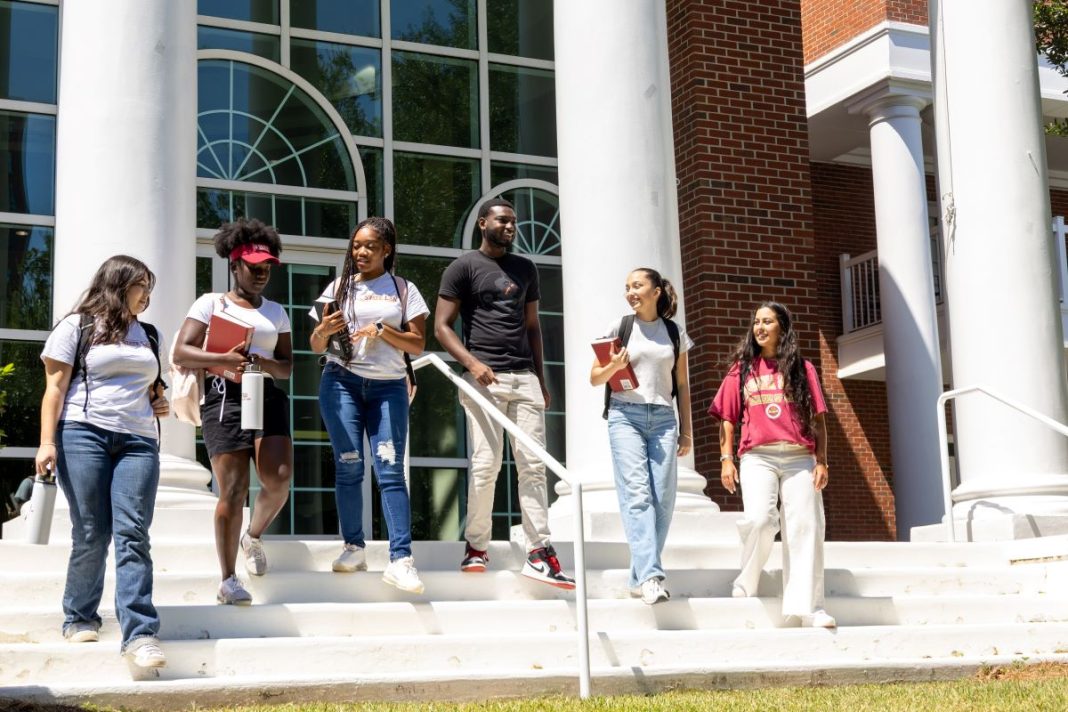Florida State University College of Law takes the No. 1 spot on preLaw Magazine’s Best Value Law School ranking, moving up from No. 8 last year.
Brigham Young University – J. Reuben Clark Law School maintained its spot at No. 2, and University of Georgia School of Law moved to No. 3 after earning the top spot last year.
University of Florida Levin College of Law moved up to No. 4 from No. 7 last year, and The University of Kansas School of Law moved to No. 5, up one spot from last year.
Building value on multiple levels is the mission at FSU Law. And alumnus Landus Anderson agrees. When he walked across the graduation stage at FSU Law in May 2022, he knew he had a strong foundation.
“It’s the absolute best launching pad and foundation one could have,” Anderson said of FSU Law. “If you really want to be successful, there’s no way you shouldn’t be. The resources are there; you just need to tap in.”
Less than two years later, he’s sitting inside the offices of the Portland Trail Blazers as a lawyer and one of the legal engines keeping an NBA franchise running.
Read the full story here.
To create the best value list, preLaw ranked law schools by assigning grades for each category, including the cost factor, and then determining an overall GPA.
This year’s list included 10 newcomers: University of Pittsburgh School of Law (A-), Boston University School of Law (B+), Northern Kentucky University – Salmon P. Chase College of Law (B+), Notre Dame Law School (B+), Southern Methodist University (SMU) Dedman School of Law (B+), UCLA School of Law (B+), University of Dayton School of Law (B+), University of Hawai’i at Manoa – William S. Richardson School of Law (B+), The University of Michigan Law School (B+) and Villanova University Charles Widger School of Law (B+).
Meanwhile, three law schools fell off the ranking list.
Best Value Law Schools
* indicates a private law school. Scroll horizontally to see all columns. Click on a column with an arrow to sort by that column and click again to sort in reverse. You may also search the table, page through the results, and set how many items to show at a time.
Top 10 Private Best Value Law Schools
Brigham Young University
Washington and Lee University
Washington University
Boston University
Notre Dame Law School
Regent University
SMU Dedman School of Law
University of Dayton
Villanova Law
Wake Forest University
*See the details for each in the chart above
Methodology
How we calculate the Best Value Rankings
To determine our best value law schools, we assign a grade to every ABA-accredited law school for Bar Exam, Employment and Costs, and then weight each grade to determine a final GPA. Bar Exam is weighted at 15%, Employment at 30%, Costs at 55%.
To determine the Bar Exam grade, we look at three different data points: 1) Two-year difference between the first-time school bar pass rate and the average state rate (27% of bar exam grade); 2) Two-year ultimate bar pass average (53%); and 3) Two-year first-time raw bar pass rate (20%).
For Employment, we determine a modified employment rate for the two most recent classes. We use the ABA’s official employment statistics and weight each category to calculate the weighted average, not counting graduates seeking further education. Categories are weighed from 100% for Bar Passage Required: Full-time, Long Term, all the way down to 10% for Non-Professional position: Full-time, Long Term. Some categories are weighted at 0%, such as Non-Professional, Part-time.
For Costs, we use the tuition rate for in-state students and the lowest cost of living expense that a school provides to the ABA. We determine the total annual cost of attendance and assign grades on a grading curve. This represents 60% of the final Cost grade.
Average debt per student makes up the other 40% of the final Cost grade. We collected this data from U.S. News & World Report and estimated it when not available. Estimates were based on tuition, cost and debt averages and historical debt figures.


